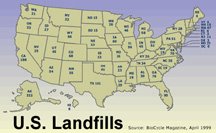New rules for landfills up for debate
The Canton Repository
CANTON - The mounds of trash at local landfills wouldn't be able to reach to the sky.
Garbage trucks leaving the landfills would have to be washed so they would not track mud on local roads.
And trash no longer would be accepted from communities that don't recycle as much as we do.
These proposed rules and more soon may become the law for the Stark-Tuscarawas-Wayne Joint Solid Waste Management District.
"You could consider them (rules) almost a constitution ... something that directs the relationship between the solid waste district and the landfill itself," said Tuscarawas County Commissioner Kerry Metzger, who sits on the waste district board.
Metzger, a member of the committee that developed the regulations, plans to submit the committee's recommendations to the district's full board Friday.
If approved, Metzger said the rules would be added to the district's 10-year waste disposal and recycling plan being written by the Ohio Environmental Protection Agency. The rules would become effective in 2008, and existing solid waste facilities would have 180 days to comply with the new regulations, Metzger said.
NEW RULES
Landfills, under the new rules, would be expected to develop a litter-control plan, monitor groundwater, operate only during specific daytime hours and deter garbage trucks from exceeding weight limits. New landfills couldn't have "an adverse impact on the quality of life," according to the proposed rules.
Some regulations could be waived if the landfills negotiate an individual agreement with the district. Any waiver must be approved by a two-thirds majority of the nine-member board - something Stark County commissioners say is "overkill."
Stark County Commissioner Jane Vignos, also a member of the committee that drafted the rules, said the district board's existing rule that five votes are needed - whether the full board is present or not - to pass a resolution is enough.
"I think it's a terrible handicap to get things done if we have to get six votes to pass anything," she said.
Metzger believes the clause is needed because "sometimes government makes it too easy to change things," but said he's willing to compromise for unanimous support of the rules.
READY FOR A CHALLENGE
He also told commissioners to expect the rules to be challenged.
The National Solid Waste Management Association already has objected to language that says local landfills can't accept trash from waste districts in the state that don't recycle as much as the regional district does. The association said it could file a lawsuit if the rule passes.
"We are saying to other districts in the state that whatever standards we set for ourselves, we expect you to meet those standards," said David Held, district executive director.
The rule doesn't affect out-of-state waste. The U.S. Supreme Court has ruled that local governments can't regulating interstate commerce, which includes trash.
NEW LANDFILL RULES
The Stark-Tuscarawas-Wayne Joint Solid Waste Management District is considering new rules that would regulate local landfills. The nine-member board is expected to vote on the proposed rules Friday.
The rules include operational standards, by which existing solid waste facilities must:
-- Minimize odors, noise, dust and vibration so that landfill activities do not exceed 90 decibels when measured from affected residences. All road surfaces within the facility's property lines shall be paved or graveled to minimize mud and dust.
-- Create a fire and emergency management plan that is approved by local fire departments.
-- Develop a litter-collection plan that addresses on- and off-site litter generated from facility activities, including litter on hauling routes leading to the facility.
-- Install wheel-washing and truck-washing stations that are approved by the local health department to prevent mud and dirt from being tracked onto local roads.
-- Accept waste only between 7 a.m. and 6 p.m. Monday through Friday and from 7 a.m. to 3 p.m. Saturdays and legal holidays unless the local board of health authorizes alternative working hours.
-- Monitor the groundwater semiannually, allow board of health to split samples and provide the district copies of the results.
-- Develop a policy to deter overweight trucks from coming to the facility. It could include issuing a warning to the violating company or deny repeat offenders access to the landfill. A report on how the policy has helped deter overweight trucks must be submitted to the district annually.
The rules also have siting requirements, under which new solid waste facilities must:
-- Be adjacent to a federal, state or county highway so that garbage truck traffic doesn't interfere with residential traffic.
-- Stay at least one mile from a school, hospital, church, park, licensed child day-care facility, public library or any place where the public gathers and the waste facility would adversely affect enjoying the area.
-- Build a barrier that is at least 10 feet tall if the facility's building is within 1,000 feet of a residence.
-- Limit the trash mounds at the landfill so it conforms with the existing typography of the surrounding area. A mound cannot be more than 50 feet above the highest naturally occurring point within 1,000 feet of the facility.
Source: Proposed rules of the Stark-Tuscarawas-Wayne Joint Solid Waste Management District

